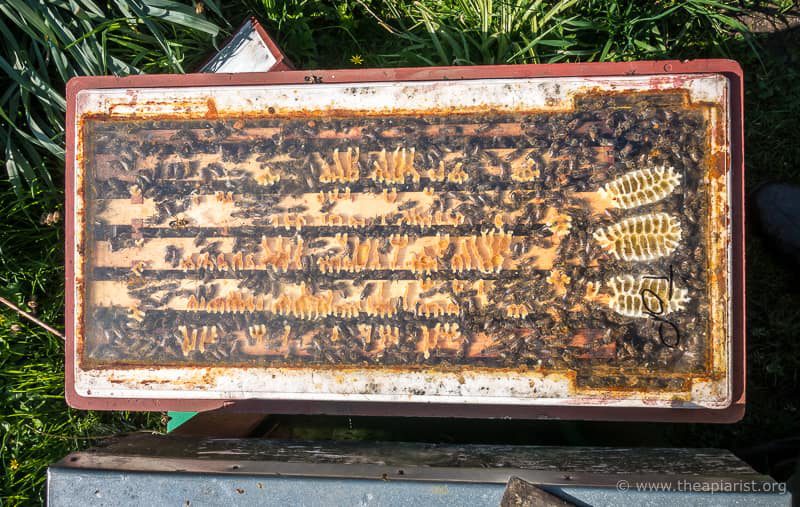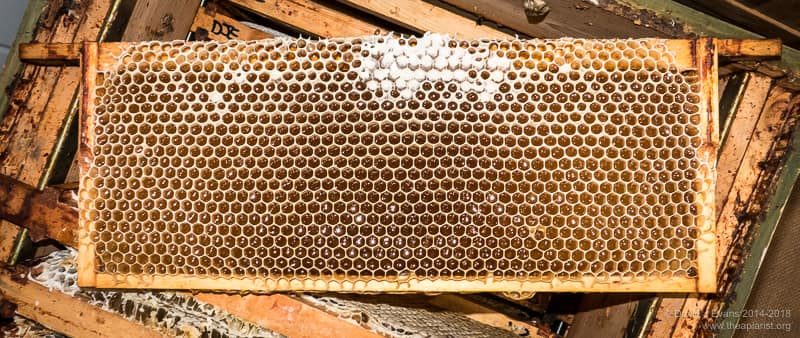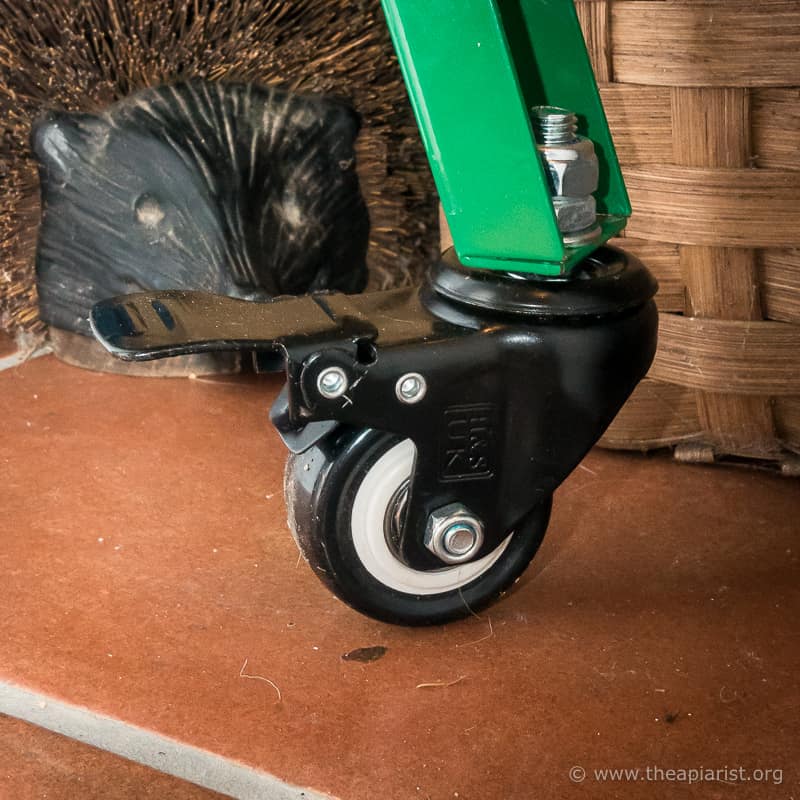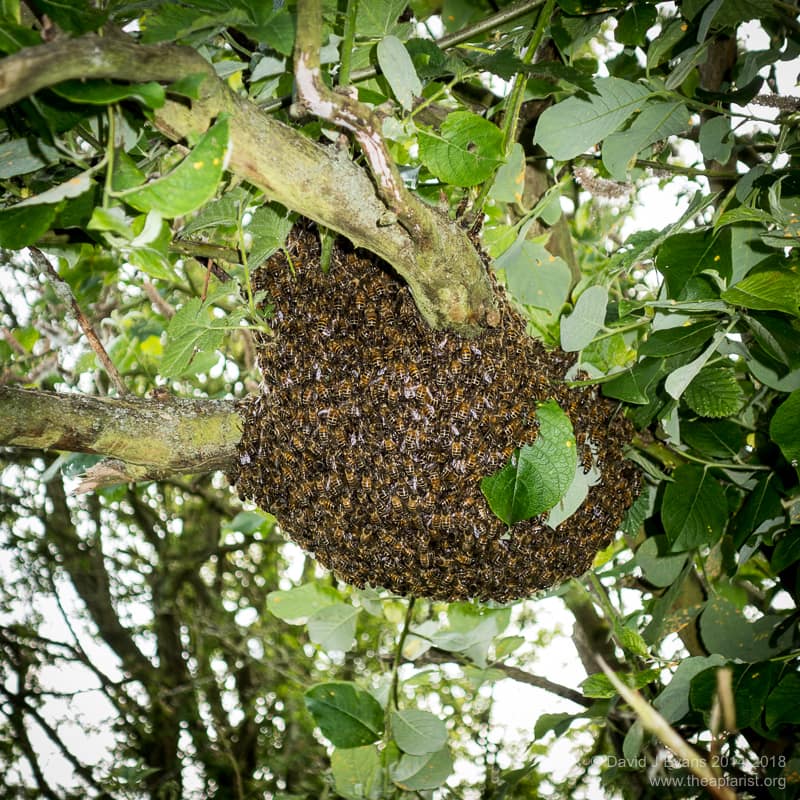Off again, on again ...
The title of this post could refer to the 2019 season, queen mating, forage availability and the honey supers.
And does …
All are, of course, related to the local weather.
This is my fourth year back in Scotland keeping bees and the season started really well. Scout bees were examining my bait hives by late April and I hived my first swarm on the last day of that month.
April had been a good month and overwintered colonies were consequently in pretty good shape and had built up well to (hopefully) exploit the early season forage. Overwintered nucs looked particularly strong …
The oil seed rape (OSR) appeared as expected – there’s quite a bit in range of both my main apiaries – and the bees started hammering it.
And then the weather reverted to ‘about average’ … which for my part of eastern Scotland in May is a mean maximum daily temperature of 12-14°C. With these lower temperatures came higher than average rainfall.
Nothing dramatic, but enough to – literally – put the dampeners on the first half of the season.
June gap
May segued into June and the OSR came and went. Work commitments kept me away from the apiary which meant the clearers went on about a week later than intended.
Unfortunately this was a week in which the weather deteriorated and strong colonies were stuck ‘indoors’ where they had little to do but scoff the stores. And when they could get out there was a shortage of forage – we’ve had a proper ‘June gap‘ this year {{1}}.
Nevertheless, after extracting I managed just shy of 50% of the total from last spring (which was an exceptional year) so I’m not complaining.
One thing notable about this season was that the majority of the supers extracted were not fully capped. Some weren’t capped at all. I’d left a few ‘drippy’ supers behind and every frame extracted passed the ‘shake test’.
After extraction I always check the water content of every bucket and it was all in the 16-17.5% region … no different from capped spring honey extracted in previous years.
Wheely good extraction
I’ve finally got round to mounting my SAF Natura 9 frame radial extractor on castors {{2}}. I re-drilled the end of the three legs to accept an M10 bolt and then fitted castors with a couple of nuts, one of which was nylon-lined so it should not work loose.
Two of the castors are braked, but they don’t need to be.
The castors make it a lot easier to move the extractor from storage to my extracting room {{3}} or to the area where I hose it out after use.

No more jiggling
But much more significantly (and the reason I fitted them in the first place) they prevent a poorly balanced extractor from ‘walking’ across the room if unbalanced and unattended.
I no longer have to cling on for dear life until the machine stops jiggling about 🙂
Of course, I always try and balance my extractor. However, the reality is that you sometimes get frames with crystallised honey which unbalance the extractor late in the run. Or runs in which no amount of juggling of the frames achieves a really satisfactory balance.
Under these circumstances the wheels allow the unbalanced extractor to oscillate from side to side rather than march off down the room.
Adding the little rubber wheels has been a revolution in my extracting if you’ll excuse the lousy pun.
… and away again
Summer has now officially started as the longest day has – like the OSR – been and gone. Today we’ve had rain, thunder and lightning i.e. a typical summer day and almost perfect conditions to return a towering stack of wet supers to the hives.
The bees were not impressed to be disturbed {{4}} but were grateful for the wet supers. By dealing with these in the late afternoon on a manky day I avoided the bees getting overexcited and triggering robbing.
It’s clear that the June gap is, if not over then certainly drawing to a close. All colonies have fresh nectar stored in the brood frames and the supers in strong colonies are starting to get heavier.
The rain might even help get a good crop from the lime this year (it was far too dry last season) but we need high temperatures as well.
With a bit of good fortune we’ll also now get some good enough weather for queen mating which has been really hit and miss for the last month.
Where did they come from?
Clearly there are some queens getting reared.
I was called out to a swarm in a neighbours garden late in the afternoon a few days ago. It had been in a low bush for a few hours and was a doddle to drop into a Paynes poly nuc. I’ve yet to see the queen so don’t know whether she’s mated or marked.
What’s puzzling is where the bees swarmed from …
My understanding is that the classic football-sized ball of bees hanging from a branch is a temporary bivouac. The swarm sets up camp there while the scouts do their scouting around looking for a better location to make a permanent residence.
In my experience the bivouacked bees are usually only a short distance from their original location. By ‘short distance’ I mean 5 to 50 metres. Perhaps 100 at the outside. You don’t just find them randomly dotted around the countryside {{5}}.
Which is what’s odd … the closest apiary to the swarm is mine (perhaps 500 metres away). I’d inspected my colonies the same afternoon. All the queens were present and correct. All are marked and clipped. None of the colonies showed any sign of wanting to swarm {{6}}. It’s definitely not from my colonies.
My village is very small. I don’t know everyone but I know someone who does. There are no other beekeepers here. So where did they come from?
Perhaps they were a swarm from a distant colony that failed to reach their intended destination (like one of my bait hives which had been getting some attention {{7}}). Alternatively they might come from a nearby feral colony.
I’m off to take a closer look at the church tower …
Colophon
The title of this post is truncated from the start of the chorus of a 1921 song by E.R. Edson about a train conductor (Flanagan) and a derailed train … “Off again, on again, gone again, Flanagan”.
{{1}}: Some colonies even needed feeding and received a frame or two of sealed stores ‘rescued’ from colonies earlier in the season.
{{2}}: Or casters, which is also an acceptable spelling apparently.
{{3}}: Except my house is on several levels which still necessitates some carrying.
{{4}}: Except for those in the bee shed who are unaffected by the local weather when you pop the crownboard off.
{{5}}: Or at least I don’t … and I spend a lot of time outdoors.
{{6}}: At least, not to me!
{{7}}: Which stopped once I’d hived the swarm.





Join the discussion ...